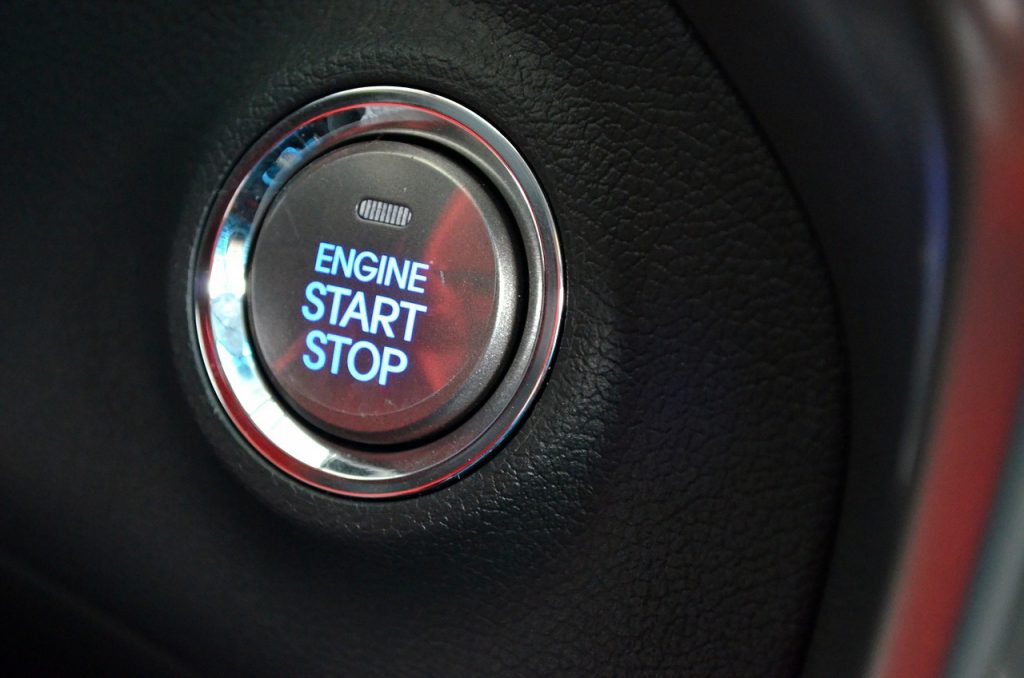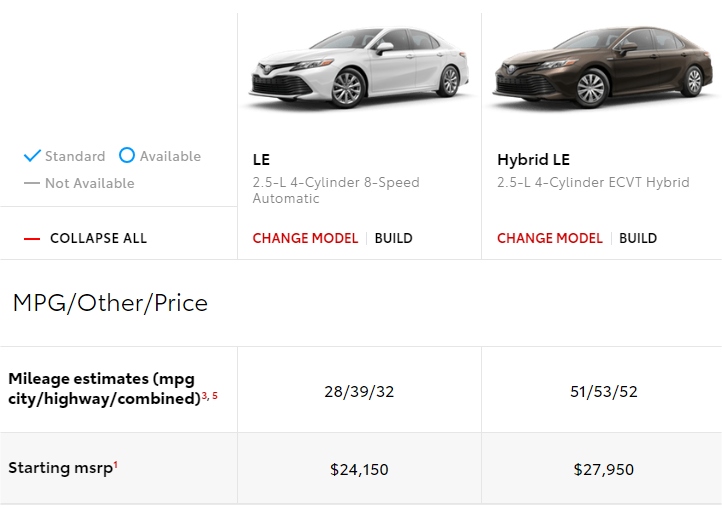
So you or someone you know is thinking of buying a hybrid car. Before you spend the money on the new wheels, make sure you are doing it for the right reason.
Say you are buying a hybrid to save the environment and the polar bears. Or do it because you can zip down the HOV lane while the rest of the plebeians sit in traffic sucking in exhaust fumes. Or maybe so you can give the middle finger to Big Oil.
But don’t buy a hybrid car because it’s going to save you money.
What, you say? I’m getting 50+ miles per gallon so I’m spending less time at the gas station buying gas and therefore I have more money in my pocketbook.
Yes and no.
Yes, you are saving money on gas. But like all things, whether you are actually saving money over driving a regular car, you will need to do the math for your situation. This is because hybrid cars tend to be more expensive than a similarly equipped car with an internal combustion engine.
Table of Contents
A Direct Comparison Between A Hybrid and A Non-Hybrid Car
While everyone thinks about the Toyota Prius when they think of a hybrid vehicle, to make a direct comparison easier I’m going to use the Toyota Camry since it is the best selling passenger car in America and has both a gas and a hybrid model.
The gas mileage for a 2018 Camry is:
The Camry LE gets 28 city / 39 highway for a combined mpg of 32.
The Camry LE Hybrid gets 51 city / 53 highway for a combined mpg of 52.
According to the Department of Transportation, the average American drives 13,476 miles a year. Let’s round that up to a nice even 15,000 miles.
Using the combined mpg numbers and 15,000 miles we get:
Regular Camry: 32 mpg x 15,000 miles = 468.8 gallons of gas a year
Hybrid Camry: 52 mpg x 15,000 miles = 288.5 gallons of gas a year
According to GasBuddy, on October 15, 2018 the average retail price of regular gas is $2.89 a gallon. For a year of driving, the cost of gas comes out to:
Regular Camry: 468.8 gal x $2.89 = $1,354.83
Hybrid Camry: 288.5 gal x $2.89 = $833.77
That comes out to a savings of $521.06 a year if you drove a hybrid car.
Awesome, right?!
Not so fast. How much did the cars cost?
Regular Camry LE: $24,150
Hybrid Camry LE: $27,950

The hybrid Camry costs an extra $3,800 over the regular gas-powered Camry.
Now divide $3,800 by $521.06 to see how long it will take for you to start coming out ahead for purchasing a hybrid:
$3,800 / $521.06 = 7.29 years
That is a long time for owning a vehicle before you even start breaking even on gas costs.
To put it in another perspective. It will take almost 109,350 miles before you will break even on the fuel costs alone.
You could argue that gas could go up to $3.89 again in the future. But even then, for the average driver it will still take 5.4 years before they’ll start saving money.
If you increased the miles driven per year to 20,000 miles at $2.89 per gallon, it will also take 5.4 years to break even.
Now if gas went up to $3.89 a gallon and you drove 20,000 miles a year, it will take you 4.1 years before you come out ahead for buying a hybrid Camry.
According to Edmunds, the average car owner who buys a brand-new car trades it in after six years. Someone who does this for a hybrid car will turn in their car for another before they even start “saving” money for purchasing a hybrid.
A frugal person would naturally say, “No problem, I plan to keep my car forever”.
Another Consideration – The Batteries
Keeping a hybrid car over 8 years opens another dilemma – what to do about the hybrid battery when it is no longer under warranty.
The EPA classifies hybrid battery as emissions equipment. Under the federal emission rules, hybrid vehicle batteries and components such as battery control modules and cooling systems must be warrantied for at least eight years or 100,000 miles.
From the below table, all the major manufacturers offer warranties in line with the federal regulations except for Chrysler, Hyundai, Kia, and the Mitsubishi Outlander PHEV, which extends the warranty to 10 years for their hybrid cars.
| Make | Warranty | Make | Warranty |
| Acura | 8 years / 100,000 miles | Kia | 10 years / 100,000 miles |
| Audi | 8 years / 100,000 miles | Lexus | 8 years / 100,000 miles |
| BMW | 8 years / 100,000 miles | Mitsubishi | 10 years / 100,000 miles |
| Chrysler | 10 years / 100,000 miles | Nissan | 8 years / 100,000 miles |
| Ford | 8 years / 100,000 miles | Tesla | 8 years / unlimited miles |
| GM | 8 years / 100,000 miles | Toyota | 8 years / 100,000 miles |
| Honda | 8 years / 100,000 miles | Volkswagen | 8 years / 100,000 miles |
| Hyundai | 10 years / 100,000 miles | Volvo | 8 years / 100,000 miles |
Hybrid vehicles registered in the states that have adopted California’s Zero Emmissions Vehicle (ZEV) program have warranty coverage for 10 years or 150,000 miles for their hybrid battery systems. The ten ZEV states as of 2018 are California, Connecticut, Maine, Maryland, Massachusetts, New Jersey, New York, Oregon, Rhode Island, and Vermont.
One exception to the warranty limits is the Hyundai Ioniq, which includes the Ioniq Hybrid, Ioniq Electric, and Ioniq Plug-In Hybrid. Hyundai offers a lifetime battery warranty to the original owner.
How long you can expect to go before your hybrid battery goes bad varies due to different driving styles. According to Autotrader, on average, hybrid batteries start to go bad when they are 10 to 15 years old and used between 120,000 to 150,000 miles.
Hybrid Battery Replacement Costs
You are driving to work one day and your dashboard lights up like a Christmas tree and it’s only July. Prius owners even have a name for this called the triangle of death. A “check hybrid system” message pops up on the display and a check with a scan tool confirms that it is a problem with the hybrid battery. How much can you expect it to cost to repair?
For something like a Toyota Prius, expect a replacement battery to cost between $2,200 and $2,600 at the dealership before labor costs. Replacing the battery can take between three and four hours. Carvana states that one Toyota dealership quoted them $3,126 total to replace the battery. They go on to say that local shops can do it for less, from $2,250 for a reconditioned battery to $2,985 for a new one.
Those with mechanical and electrical knowledge and lots of time can also disassemble their battery pack and replace the individual cells that have gone bad. A Prius battery is made up of 28 cells and you’ll have to test each one. A replacement cell costs less than $100. But this is like playing whack-a-mole since there is no telling how long until another module fails.
For most DIYer’s, you can find remanufacturered or reconditioned hybrid batteries such as ones from Dorman Products for around $1,400 with a one year warranty.
Closing $ense
As you can imagine, for most drivers when faced with a $2,250 to $3,100 bill to replace the hybrid battery for a 10 year old car that’s worth maybe $5,000 or less isn’t that appealing. They go to the dealership to get a quote for the battery replacement, get sticker shock, then see all the new cars on the lot, and end up driving home in a new ride with car payments for the next half a decade again.
Like all things, before choosing to buy a hybrid car over a normal gas-powered car, run the numbers for your situation. Hybrid cars tend to cost more than a regular car due to the batteries and hybrid components. Be sure to price in new replacement batteries after 10 to 15 years if you plan to keep a hybrid long term. Due to the cost of this consumable item, your actual savings may vary.
The real savings owning a hybrid come in if you have an occupation such as a realtor where you really rack up the miles on the road. For those who are commuting long distances to an office, your hybrid vehicle may save you money in gas, but your job is costing you your life.
New vehicles are one of the biggest purchasing decisions we make and they are also one of the biggest wealth killers due to depreciation. For many cars coming off the assembly line today, the odometer rolling over 100,000 miles is nothing. Your biggest savings would be to buy a car, whether it is a hybrid or not, and keeping it forever.
Do you own a hybrid electric car or are you thinking of buying one? What’s your reasoning for going with an alternative fuel vehicle?
